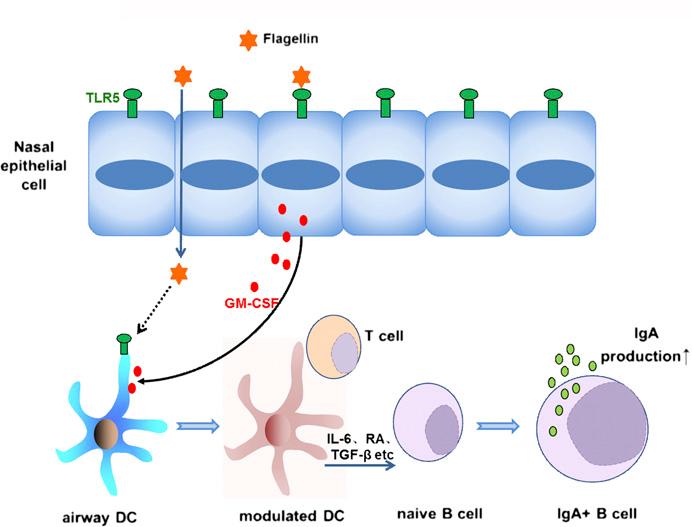
The TLR5 agonist flagellin has been proven as an effective mucosal adjuvant, in addition to its systemic adjuvant activity, when administered via the i.n. route, which can prominently increase a protective IgA response. However, the mechanism by which flagellin drives a mucosal immune response when acting as an i.n. adjuvant remains elusive.
In a present study, the research group led by Prof. YAN Huimin from Wuhan Institute of Virology of the Chinese Academy of Sciences focused on the mechanism of the airway dendritic cells (DCs) modulation and subsequent IgA enhancement.
Their study confirmed that direct flagellin stimulation was insufficient to activate DCs and enhance DC-mediated IgA response.
Using an in vitro system for culturing mouse primary NECs (mNECs), they found that NECs play an important role in TLR5-mediated DC activation and IgA enhancement.
Flagellin-activated NECs secreted certain cytokines, particularly GM-CSF, and these conveyed the TLR5 signal of NECs to mucosal DCs, resulting in the subsequent IgA responses.
This study helps to understand TLR5-mediated immune activation in the airway and provide insight into a new function of epithelial GM-CSF in modulating immune responses.
The results have been published in Journal of Leukocyte Biology entitled "Nasal epithelial GM-CSF contributes to TLR5-mediated modulation of airway dendritic cells and subsequent IgA response" under the Frontline Science Section as "Leading Edge Research".
This work was supported by grants from the National Natural Science Foundation of China, National Science and Technology Major Project on Major Infectious Diseases, Ministry of Science and Technology of China (973 Program), and Grants of Deutsche Forschungsgemeinschaft.

Mechanism of TLR5-induced IgA enhancement in airway system. (Image by YAN Huimin)

86-10-68597521 (day)
86-10-68597289 (night)

86-10-68511095 (day)
86-10-68512458 (night)

cas_en@cas.cn

52 Sanlihe Rd., Xicheng District,
Beijing, China (100864)

